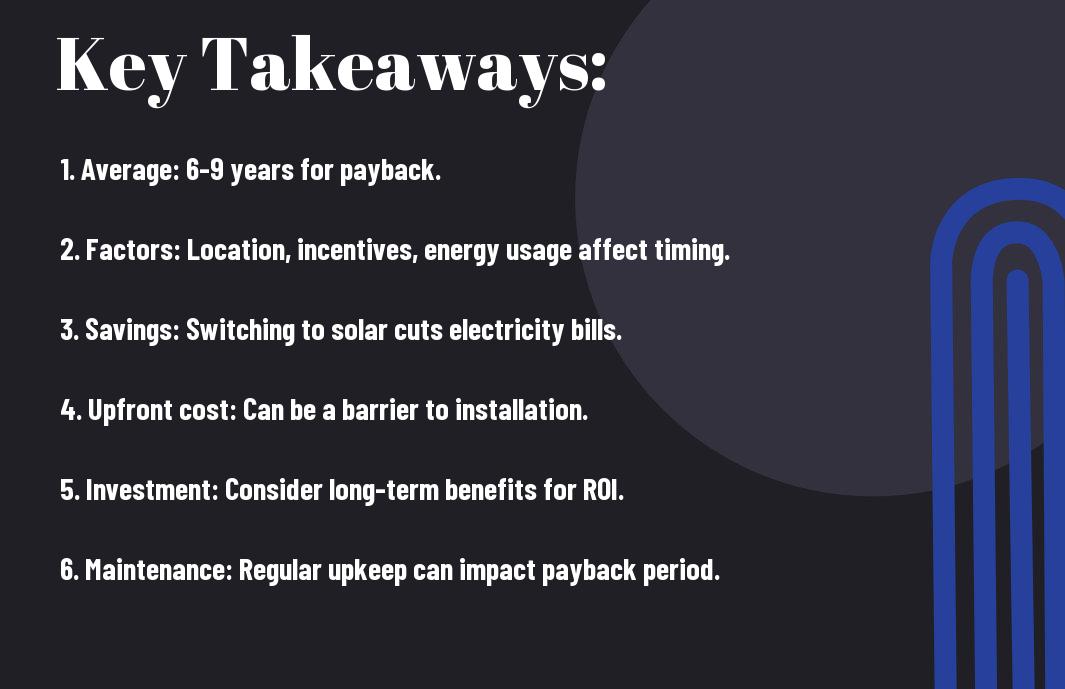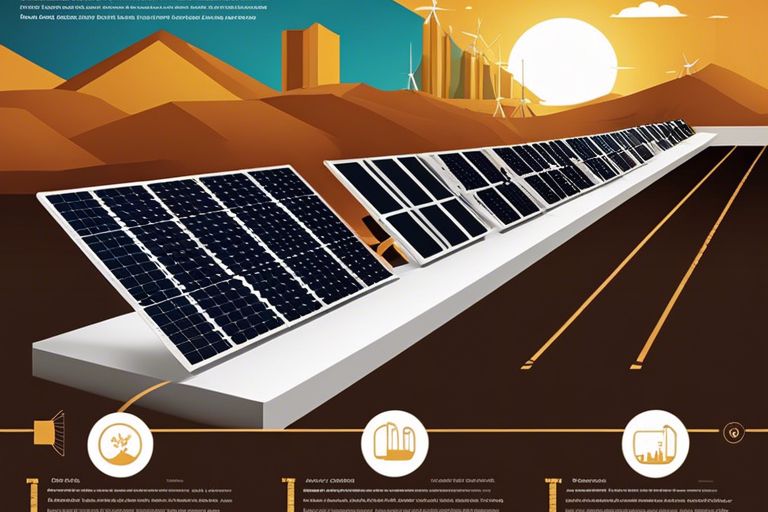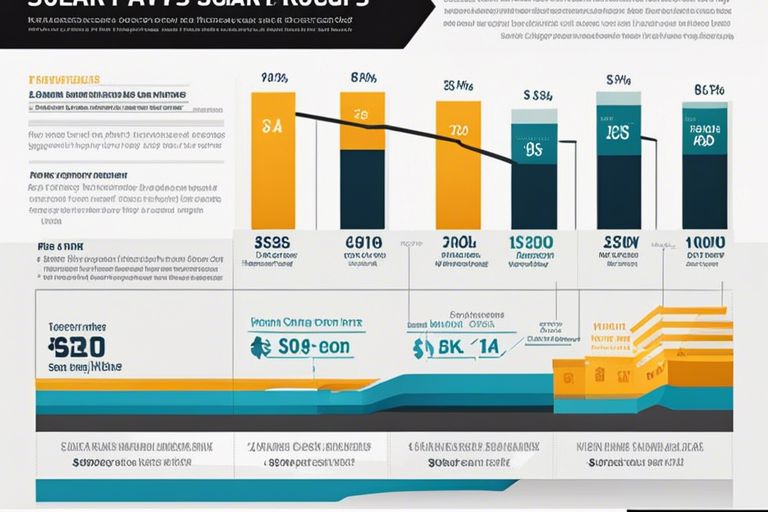There’s a lot of buzz around solar panels and their benefits, but have you ever wondered how long it actually takes for them to pay off? Investing in solar panels is not just good for the environment; it can also save you money in the long run. In this blog post, we will break down the factors that influence how quickly your solar panels will pay off, so you can make an informed decision about whether solar panels are a good investment for you.
Key Takeaways:
- Solar panel payback period: Solar panels typically pay for themselves in 5 to 10 years, depending on various factors like upfront costs, energy savings, and incentives.
- Factors affecting payback time: The location’s solar resource, system size, energy consumption, electricity rates, and available incentives can impact how quickly solar panels pay off.
- Long-term savings: After the initial payback period, solar panels can provide significant savings on electricity bills, allowing for a return on investment over the lifespan of the system.


The Benefits of Solar Panels
Environmental Impact
To truly understand the benefits of solar panels, you need to consider their positive environmental impact. With solar panels installed on your roof, you are generating clean, renewable energy that reduces the carbon footprint of your household. By relying on the sun’s energy instead of fossil fuels, you are helping to combat climate change and minimize air pollution. Additionally, solar panels require minimal water for maintenance compared to traditional power plants, further contributing to water conservation efforts.
Financial Savings
An important benefit of solar panels is the potential for significant financial savings over time. By generating your own electricity, you can reduce or even eliminate your monthly utility bills. In some cases, you may even be able to earn credits for the excess energy your solar panels produce, further lowering your overall energy costs. Additionally, many governments offer incentives such as tax credits and rebates for installing solar panels, making the initial investment more affordable.
Another financial benefit of solar panels is the increase in property value they can bring. Homes with solar panels are often more attractive to buyers, leading to a higher resale value. So, not only are you saving money on your energy bills, but you are also making a smart investment in your home’s value.
Benefits of solar panels extend beyond just saving money and helping the environment. Making the switch to solar power also provides you with energy independence and stability. By generating your own electricity, you are less reliant on external energy sources and less susceptible to fluctuating energy prices. With solar panels, you can take control of your energy consumption and future-proof your home against rising energy costs.

Factors Affecting Payoff Time
Now, let’s discuss the various factors that can affect the time it takes for your solar panels to pay off:
Initial Investment Costs
Time and again, the initial investment costs are a crucial factor in determining how long it will take for your solar panels to pay off. These costs include the price of the solar panels, installation fees, permit costs, and any additional equipment needed for the system. The higher the initial investment costs, the longer it typically takes to break even on your solar panel investment.
- Higher quality solar panels may have a higher upfront cost but could be more efficient and durable in the long run, potentially leading to a quicker payoff.
- Opting for a larger system size may increase your initial investment but could generate more electricity, ultimately shortening the payoff period.
Assume that you choose cost-effective options that balance quality and system size to optimize your payoff period.
Energy Efficiency
The efficiency of your solar panels plays a significant role in how quickly you can recoup your investment. High-efficiency solar panels can convert more sunlight into electricity, maximizing the energy output of your system. This increased energy production can shorten the payoff time for your solar panels.
Investment in high-efficiency solar panels may result in a quicker return on investment as you generate more electricity and potentially rely less on grid power.
Local Incentives and Policies
Investment in solar panels can be influenced by local incentives and policies that offer financial benefits to homeowners. These incentives may include tax credits, rebates, net metering programs, or other state or local policies that support solar energy adoption. Taking advantage of these incentives can significantly impact the payback period of your solar panel system.
Investment in solar panels in regions with robust incentives and supportive policies can accelerate the payoff time, making it more financially attractive to invest in solar energy.
Initial
Calculating Payoff Time
Keep Solar Payback Period: How Soon Will They Pay Off?
Simple Payback Period (SPP) Method
For a straightforward calculation of how long it will take for your solar panels to pay off, you can use the Simple Payback Period (SPP) Method. This method involves dividing the total cost of your solar system by the annual savings you will receive on your electricity bill. The result will give you the number of years it will take for your solar panels to pay for themselves.
Discounted Cash Flow (DCF) Method
To investigate deeper into the financial aspects of solar panel payback, you can use the Discounted Cash Flow (DCF) Method. This method takes into account the time value of money by discounting the future cash flows from your solar system back to their present value. By considering factors like financing costs and inflation rates, the DCF method provides a more accurate picture of your solar panel’s payback timeline.
Another important factor to consider with the Discounted Cash Flow (DCF) Method is the discount rate you use in your calculations. The discount rate reflects the rate of return you could get from alternative investments of similar risk. A higher discount rate will result in a shorter payback period for your solar panels.
Net Present Value (NPV) Method
Flowing from the Discounted Cash Flow (DCF) Method, the Net Present Value (NPV) Method calculates the present value of all cash inflows and outflows associated with your solar panel system. By subtracting the initial investment cost from the present value of the expected savings over time, you can determine whether your solar panels will generate a positive or negative return on investment.
Method: When using the Net Present Value (NPV) Method, a positive NPV indicates that your solar panels will earn more than the initial investment over the system’s lifetime, making it a financially viable option.
Average Payoff Times for Different Scenarios
Residential Solar Panels
With residential solar panels, the average payoff time can vary depending on factors such as your location, the size of your system, your energy consumption, and available incentives. On average, it may take around 5 to 8 years for your solar panels to pay off. After this initial period, you can enjoy significant savings on your electricity bills for the remaining lifespan of the solar panels.
Commercial Solar Panels
Different from residential setups, commercial solar panels have a larger system size and higher energy consumption, which can lead to a quicker payoff time. With commercial solar panels, you may see a return on your investment in approximately 3 to 5 years. This shorter payoff period is often attributed to the scale of the system and the potential for higher energy production, resulting in greater savings on operational costs.
This rapid payoff period for commercial solar panels can provide businesses with a competitive edge by reducing overhead expenses and demonstrating a commitment to sustainability, which can be appealing to customers, investors, and stakeholders.
Industrial Solar Panels
Commercial and industrial solar panels are typically larger in scale and may require a higher upfront investment. However, the payoff time for industrial solar panels can be notably shorter than residential or commercial installations. With industrial solar panels, you could potentially see a return on investment in as little as 2 to 4 years, thanks to the substantial energy production and savings achieved by these large-scale systems.
Scenarios where energy consumption is high or where there are ample roof or ground space for extensive solar panel installations can significantly impact the payoff time for industrial solar panels, making them a lucrative investment for many businesses.
Real-World Examples
Residential Case: California Homeowner
Despite the initial investment, solar panels can provide significant long-term savings. Let’s consider a California homeowner who decides to install solar panels on their roof. The average cost of a residential solar panel system in California is around $15,000 after incentives. With an average monthly electricity bill of $150, you could save about $1,800 a year on electricity costs. This means your solar panels could pay for themselves in about 8-9 years.
Commercial Case: Small Business Owner
Business owners can also benefit from installing solar panels on their commercial properties. Any small business owner in a sunny state like Arizona may find that a solar panel system costing around $50,000 can offset a yearly electricity bill of $6,000, potentially leading to a payback period of around 8-9 years. By investing in solar panels, you not only reduce operating costs but also demonstrate a commitment to sustainable practices, which can attract environmentally conscious customers.
Another advantage for small business owners is the available incentives and tax credits for installing solar panels. In addition to long-term savings on electricity bills, you may also benefit from federal investment tax credits, accelerated depreciation, and local rebates, reducing the upfront cost of your solar panel system.
Maximizing Payoff Time
Once again, maximizing the payoff time of your solar panels involves implementing strategies to increase their efficiency and effectiveness. By making the most of your solar energy system, you can significantly reduce the time it takes for your investment to pay off.
Optimal Panel Placement and Maintenance
Maximizing the payoff time of your solar panels involves ensuring optimal panel placement and regular maintenance. Proper placement of solar panels is crucial for maximizing sunlight exposure and energy production. Additionally, regular maintenance, such as cleaning panels and checking for any issues, can help ensure that your system operates at peak performance, reducing payback time.
Energy Storage Systems
One way to maximize the payoff time of your solar panels is by investing in energy storage systems. These systems allow you to store excess energy generated during the day for use during periods of low sunlight or high energy demand. By incorporating energy storage, you can maximize the utilization of your solar energy system and potentially reduce payback time.
To further maximize the benefits of energy storage systems, consider integrating smart energy management technologies that can optimize energy usage based on your consumption patterns and energy production levels.
Energy Efficiency Upgrades
Optimal energy efficiency upgrades can also contribute to maximizing the payoff time of your solar panels. By improving the overall energy efficiency of your home or building through upgrades such as insulation, energy-efficient appliances, and smart thermostats, you can decrease your overall energy consumption and reliance on the grid. This, in turn, can help you achieve a faster return on investment for your solar panels.
It is necessary to consider a comprehensive approach that combines maximizing panel efficiency, utilizing energy storage systems, and implementing energy efficiency upgrades to get the most out of your solar energy investment.
Conclusion
To wrap up, the decision to invest in solar panels depends on a variety of factors, including your energy usage, location, and the cost of solar installation in your area. While the payback period for solar panels can vary, typically ranging from 5 to 15 years, the long-term savings on your energy bills and potential tax incentives may make it a financially sound choice in the long run. By carefully considering these factors and consulting with a solar professional, you can make an informed decision about whether solar panels are a worthwhile investment for you.
Q: How long does it take for solar panels to pay off?
A: The payback period for solar panels can vary based on factors such as the cost of the system, your energy usage, available incentives, and local sunlight conditions. On average, most homeowners see a return on their investment in about 5 to 8 years.
Q: What factors can affect the payback period for solar panels?
A: Some key factors that can impact how long it takes for solar panels to pay off include the cost of the system, your energy consumption habits, the amount of sunlight your property receives, any available incentives or rebates, as well as financing options.
Q: Are there any ways to shorten the payback period for solar panels?
A: Yes, there are several ways to potentially reduce the payback period for solar panels. These include taking advantage of tax incentives, rebates, and other financial incentives, maximizing your energy savings by using energy-efficient appliances and practices, and selecting a financing option with favorable terms.
